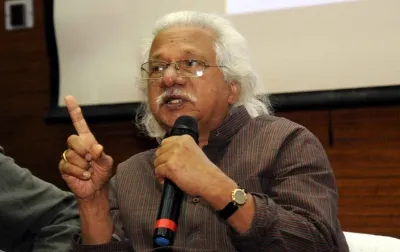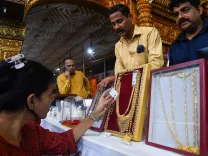What Controversy Surrounds Adoor Gopalakrishnan's Remarks on SC/ST Filmmakers?

Synopsis
Key Takeaways
- Adoor Gopalakrishnan's remarks on SC/ST filmmaker grants have sparked major controversy.
- A Dalit activist has lodged complaints, citing violations of the SC/ST Act.
- The government's film policy aims to correct historical imbalances in representation.
- Strong responses from government officials highlight the importance of inclusivity.
- Public perception of marginalized communities is under scrutiny following these comments.
Thiruvananthapuram, Aug 4 (NationPress) A Dalit activist has filed a complaint with both the police and the Kerala SC/ST Commission against renowned filmmaker Adoor Gopalakrishnan over his contentious statements regarding government funding for women and Scheduled Caste/Scheduled Tribe (SC/ST) filmmakers.
Dinu Veyil, the activist, expressed on Monday that he initiated the complaints against Gopalakrishnan for his remarks made during a recent conclave, where he questioned the Kerala government's inclusive film policy, provoking strong reactions from Kerala Cultural Affairs Minister Saji Cherian and various rights advocates.
The esteemed Dadasaheb Phalke award winner, while addressing the Kerala Film Policy Conclave in Thiruvananthapuram, remarked that the Rs 1.5 crore grant allocated to filmmakers from marginalized communities by the Kerala State Film Development Corporation (KSFDC) was excessive and might lead to corruption.
He purportedly suggested that these filmmakers should undergo "intensive training" for a minimum of three months, proposing that the grant amount should be decreased to Rs 50 lakh to benefit a larger number of individuals.
In his complaint lodged with the Museum Police in Thiruvananthapuram and the SC/ST Commission, Dinu Veyil claimed that Adoor Gopalakrishnan's comments violated the SC/ST (Prevention of Atrocities) Act.
In a Facebook post, Veyil stated, "Through his statement, Adoor Gopalakrishnan seems to depict members of the SC/ST communities as inherently criminal or dishonest. This generalization could invoke penal provisions under Section 3(1)(u) of the SC/ST (Prevention of Atrocities) Act, which forbids the incitement of ill-will against these communities."
"By insinuating that beneficiaries of government welfare schemes from the SC/ST categories would misuse the funds, the speaker suggests that these communities are prone to dishonesty and corruption, potentially fostering prejudice and social animosity," asserted the activist in his post.
“Moreover, phrases such as 'They should be told to understand that this is public fund' and 'They have thought that they will take this money, they can take it and take a picture' depict the SC/ST communities as unknowledgeable and irresponsible. Such characterization amounts to intentional public humiliation, which is punishable under Section 3(1)(r) of the same Act,” his post elaborated.
Veyil emphasized that although Gopalakrishnan’s remarks might not have targeted specific individuals, they collectively demean all SC/ST individuals linked with the ongoing scheme, including those present at the event, those who had previously applied for benefits, and those following the statements through media.
In a robust rebuttal during the same event, Minister Saji Cherian defended the government's initiative, branding it a landmark decision to rectify historical disparities in the film industry. The Minister confirmed that the policy aimed to integrate individuals from under-represented communities into mainstream cinema after nearly a century of exclusion, a policy the government intends to uphold.









